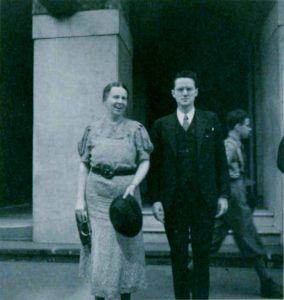Olga Umansky, MLIS, is a librarian and archivist of the Hanns Sachs Library at BPSI. Her remarks below originally appeared in the Spring 2021 issue of the library newsletter, which can be read here.

Julia Deming, MD (1892-1968) was one of BPSI’s founding members, appointed a faculty member in 1943, vice president in 1946-1948 and treasurer in 1951-1955. Originally from Oswego, Kansas, she went to study at Bryn Mawr and then at Women’s Medical College of Pennsylvania, graduating with “highest honors ever attained by a woman medical student in the US.” She did her residency at the Boston Psychopathic Hospital, studied at the Harvard School for Public Health for a year, and became head psychiatrist at the Home for Little Wanderers in 1928-1931. She was among several young Americans who went to Vienna in the early 1930s to be trained by Freud. A photograph of Julia Deming walking alongside another American psychiatrist, John M. Dorsey, was recently discovered at the BPSI Archives. This small screenshot, found among the Bibring photos and probably taken in Vienna in 1937, is the only image of Deming we have. Dorsey mentions her and other American trainees in his book An American Psychiatrist in Vienna, 1935-1937, and his Sigmund Freud: in one of his free association sessions with Professor Freud in October 1935 a sarcastic review of Dorsey’s book Study of the Person, is being discussed. Dorsey confesses to Freud that the publication was “brought to his attention in Vienna by Julia Deming.” (p. 26). Dorsey vividly captures the spirit of the era: “In my Wien everyone ‘lived and breathed’ psychoanalysis, never seeming to tire of this love invested theme. I lived my psychoanalytic community quite as an enlargement of my earliest family and neighborhood living. Many a specially dear and lifelong friendships began in this unique setting of singular life devotion.” (p. 23). While in Vienna, American trainees studied German and attended various lectures recommended by Freud. Dorsey recalls Dr. Droll’s 1936 lecture on brain research where Bostonians, such as Joseph Michaels, Julia Deming, and Helen Ross, were in attendance (p. 60). The 1937 roster of the Vienna Psychoanalytic Society lists Julia Deming as an Associate Member, living at Langegasse 32. Her published English translations of August Aichhorn’s and Steff Bornstein’s works suggest she was fluent in German and interested in child analysis. When Anschluss happened, Julia Deming was held incommunicado for three weeks, then was allowed to leave Vienna for Switzerland, where she stayed until 1940. Upon her return to Boston, she became a BPSI Training Analyst and taught many courses, including special seminars for social workers and nursery school teachers on Psychological Problems of Case Work and Nursery School Problems. Dorsey went on to become a prominent psychiatry professor at Wayne State University and the president of the Michigan Association for Psychoanalysis. Dorsey’s books in our library, cordially signed to the Bibrings, show that he kept in touch with his Boston colleagues until the end of his life. Julia Deming, a grandniece of a Civil War Pennsylvania governor Andrew Gregg Curtin, returned to Philadelphia after her retirement in 1964.
References:
- (1968, March 8). Dr. Julia Deming, 76, Was Hub Psychiatrist. Boston Globe.
- Dorsey, J, M. (1976). An American Psychiatrist in Vienna, 1935-1937, and his Sigmund Freud. Detroit: The Center for Health Education.
- Hendrick, I. (1961). The Birth of an Institute: Twenty-fifth Anniversary the Boston Psychoanalytic Institute, November 30, 1958. Bond Wheelwright Company.
- (1944). Notes. Psychoanalytic Quarterly, 13: 270. PEP Web Link.
Olga Umansky can be contacted by email here.
***
The opinions or views expressed on the Boston Psychoanalytic Society & Institute (“BPSI”) social media platforms, including, but not limited to, blogs, Facebook posts and Twitter posts, represent the thoughts of individual contributors and are not necessarily those of the Boston Psychoanalytic Society & Institute or any of its directors, officers, employees, staff, board of directors, or members. All posts on BPSI social media platforms are for informational purposes only and should not be regarded as professional advice.
BPSI does not control or guarantee the accuracy, relevance, timeliness or completeness of information contained in its contributors’ posts and/or blog entries, or found by following any linked websites. BPSI will not be liable for any damages from the display or use of information posted on its website or social media platforms. BPSI cannot and does not authorize the use of copyrighted materials contained in linked websites.

